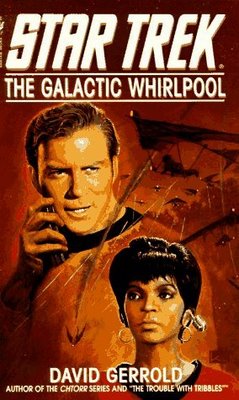 The Galactic Whirlpool
The Galactic WhirlpoolDavid Gerrold
223 pages
Bantam, 1980
This book is bound up in a series of really weird coincidences for me. Some time ago I stumbled across the Wikipedia article on fan films, a subject which has tangentially held my interest for some time. This time I took the time to read up on some of the fan films out there, which, since I am not so secretly a Star Trek geek, led me to the Star Trek New Voyages site. They kick all buttocks, by the way. As I was scanning through the news on that site I stumbled across their item about David Gerrold. Since I am a Star Trek geek I instantly recognized Gerrold as the mad genius behind the classic Trek episode “The Trouble With Tribbles.” I also knew Gerrold as the author of the War Against the Chtorr series, which, quite frankly, had turned out not to be my cup of tea, so I had not really read many other books from Gerrold. I did some reading on his site and somehow stumbled across a bit about this book. Then about a month later I stumbled across this book in a used book store I frequented many many moons ago. As I am now in the midst of another Star Trek kick, I had to pick it up.
The coincidences continued, but took an eerily prescient tone, once I began reading the book. Kirk and the Enterprise encounter a huge colony ship at the edges of Federation space and it turns out this colony ship is full of humans. Once the confusion regarding the origin of the ship is straightened out and contact is made it is made clear that society aboard the ship has suffered a breakdown leading to the establishment of two separate classes on the ship. There are those who live in the sections towards the fore of the ship. These sections still have power and have been constructed to have an Earth-like appearance which allows the residents of these sections to farm for sustenance. These people see themselves as the true inheritors of control of the ship and refer to their leader as Captain. Then there are the demons inhabiting the lower sections of the ship. Power is scarce in these sections of the ship and as these areas are primarily service and technical areas, there is very little farming that can be done, leaving these people to scavenge for everything they need for sustenance. This really has echoes of H. G. Wells Time Machine, but no matter as Gerrold tells this tale with quite some ability, which has me thinking about revisiting the War Against the Chtorr series.
The coincidences? Read this:
Our—our national purpose now is no longer so noble. No one talks of stars. When someone speaks of the original dream, there is always someone to answer him that we cannot look for stars until the last shred of the rebellion is crushed. The journey is cancelled until the mutiny is suppressed. But no one really tries to conquer the savages. There are too many of them, and the world is too large, and they have too many places to hide. So the war continues forever. And no one dreams of stars anymore.This passage sent a chill up my spine. I was so stunned I almost dropped the book. While the character is discussing what has happened to her world, it sounds like a description of what some would say we are going through in America today. The parallel continues later in the book where one of the scientists aboard the colony ship is discussing the current captain’s fanaticism and his willingness to ignore inconvenient truths to serve what he believes is the greater good (pages 146-147 in my edition for those of you interested enough.)
These coincidences as I keep calling them are not really coincidences at all, but rather the evidence of a thoughtful writer at work and serve as an example of some of the best traits of classic science fiction. Good science fiction is about the people and not the science. Here the ray guns and robots are just so much set dressing which allow the author to repose important question. What does it mean to be human? Great science fiction comments on society. Great science fiction will withstand the test of time. While Star Trek is not generally thought of as great science fiction, from time to time some great science fiction has happened in the guise of Star Trek. I believe this book may have been one of those times.
Next Up: Back to the serious reading with John Perkins Confessions of an Economic Hitman.
(Please note: My copy is a first edition of this book from 1980 and has a much MUCH better cover than the picture posted here, which is from the 1997 reprint edition.)

1 comment:
This book sounds like a thought-provoking exploration of social inequality.
Post a Comment